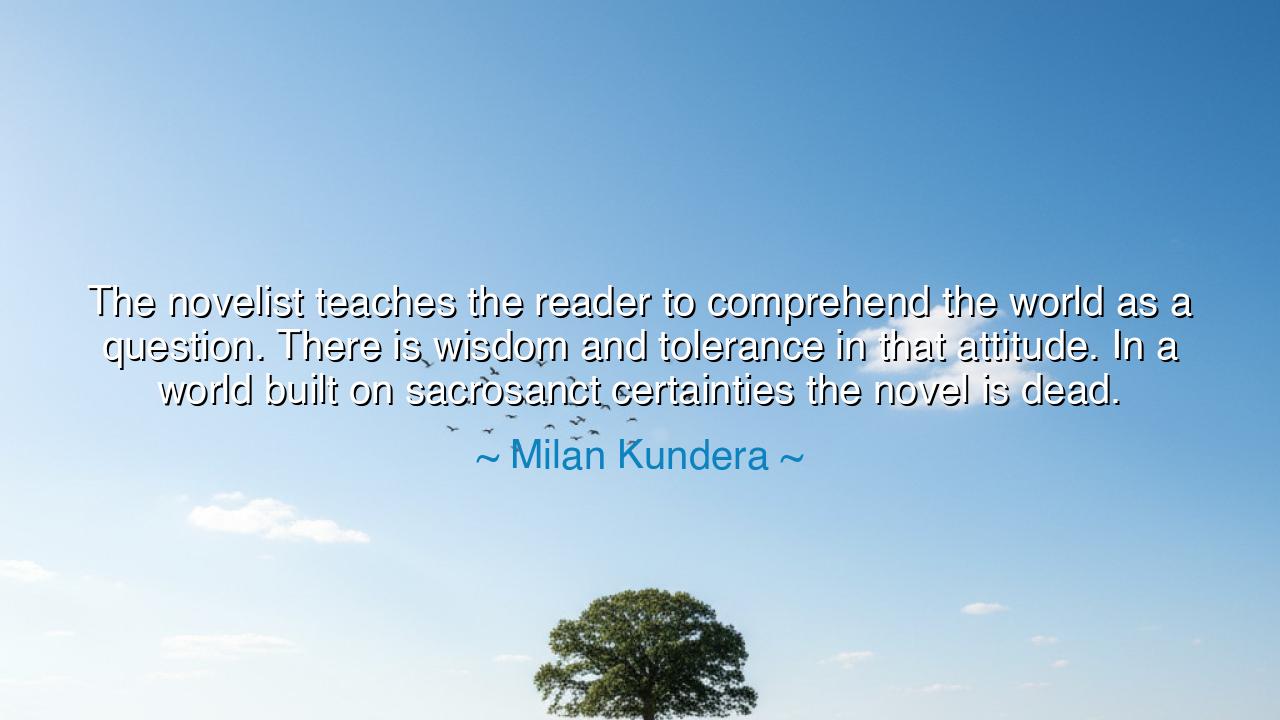
The novelist teaches the reader to comprehend the world as a
The novelist teaches the reader to comprehend the world as a question. There is wisdom and tolerance in that attitude. In a world built on sacrosanct certainties the novel is dead.






Host: The quiet of the café was a stark contrast to the noise outside, where the world seemed to rush forward, constantly moving. Inside, the dim lighting cast soft shadows across the tables, the hum of muted conversations providing a gentle soundtrack to the evening. Jack sat across from Jeeny, his fingers absentmindedly tapping the side of his cup, while Jeeny, her gaze distant, seemed lost in thought. After a moment, she looked up, her voice cutting through the calm.
Jeeny: “I read something today by Milan Kundera. He said, ‘The novelist teaches the reader to comprehend the world as a question. There is wisdom and tolerance in that attitude. In a world built on sacrosanct certainties, the novel is dead.’ What do you think of that?”
Jack: He tilted his head slightly, considering the words carefully. “Sounds like Kundera’s saying that fiction, that novels, have a way of forcing us to question everything. To see the world not as a set of concrete answers, but as something fluid, something we’re constantly figuring out. In a world where certainty and right answers are celebrated, there’s no room for the novel, because it thrives on ambiguity.”
Host: The air around them seemed to settle, as though Jack’s response had opened a new door, one that led them deeper into the heart of Kundera’s words. The rain outside had softened, the steady beat against the window now a subtle backdrop. Jeeny’s expression was steady, thoughtful, as she spoke again, the calmness in her voice carrying a quiet challenge.
Jeeny: “I think that’s exactly what makes novels so important, though. They ask questions, they don’t give answers. They teach us that life isn’t about having everything figured out—it’s about being open to the uncertainty. The world, with all its certainties and rigid beliefs, leaves no room for growth. But a novel? A novel leaves room for the unknown, for the complexity of life.”
Jack: He leaned back, his expression both skeptical and intrigued. “But isn’t that a little dangerous? Not having answers? In a world where things are so polarized, don’t we need some certainty, something to hold onto? It feels like if you live in constant uncertainty, you’re never going to get anywhere. The novel might teach us to ask questions, but at some point, don’t we need to know what’s right?”
Host: The café had grown quieter, the only sound now the faint murmur of other patrons and the soft whisper of the rain outside. Jeeny’s voice remained calm, though it carried an intensity that seemed to pull Jack in, like she was offering something just out of reach.
Jeeny: “Maybe it’s not about having answers that make us comfortable, Jack. Maybe it’s the questions themselves that lead us to a deeper understanding of the world. Certainty doesn’t allow for growth. It shuts things down. Wisdom comes from recognizing that we don’t have all the answers, from understanding that everything is open to interpretation, to change. And it’s through that uncertainty that we learn.”
Jack: He absorbed her words, the sharpness in his expression now softened, like he was starting to see the logic in her argument. “But isn’t there something about having convictions, about being sure of what you believe, that allows you to take action? If everything is a question, doesn’t it just make you stay still, paralyzed by doubt?”
Jeeny: “It’s not about being paralyzed by doubt, Jack. It’s about being able to live with that doubt. The novel doesn’t tell us what to believe; it opens our eyes to the possibilities. It shows us the complexity of human experience, and the tension between what we think we know and what we have yet to understand. It’s tolerance in action. It’s an invitation to live with the questions without needing to close them off with easy answers.”
Host: The stillness of the café wrapped around them as Jeeny’s words resonated deeper, like a quiet truth beginning to settle. Jack sat back, his gaze distant as he thought about the weight of her argument. The rain outside, once again, had quieted, leaving a sense of calm in its wake.
Jack: “I see what you’re saying now. Maybe it’s not about finding the right answer; it’s about staying open to the question. To possibility. Maybe the world feels more alive when we stop trying to pin everything down and just let it be what it is—uncertain, complex, and constantly changing.”
Jeeny: “Exactly. The novel doesn’t want to give you answers—it wants you to explore, to think, to sit with what’s unresolved. And in that process, we find our humanity. We learn to live with the unknown and embrace the richness that comes from questioning everything.”
Host: The café seemed to hum with a quiet energy, the conversation between Jack and Jeeny now a moment of shared understanding. The rain had stopped, but the world outside still felt distant, as if the questions they had discussed had opened a space in their minds. Jack and Jeeny sat in the glow of that realization, understanding that the greatest wisdom might not lie in answers, but in the freedom to ask—to question the certainties of the world and to embrace the complexity that came with it. The novel, in its infinite questions, was alive with meaning, waiting for them to discover its depth.






AAdministratorAdministrator
Welcome, honored guests. Please leave a comment, we will respond soon